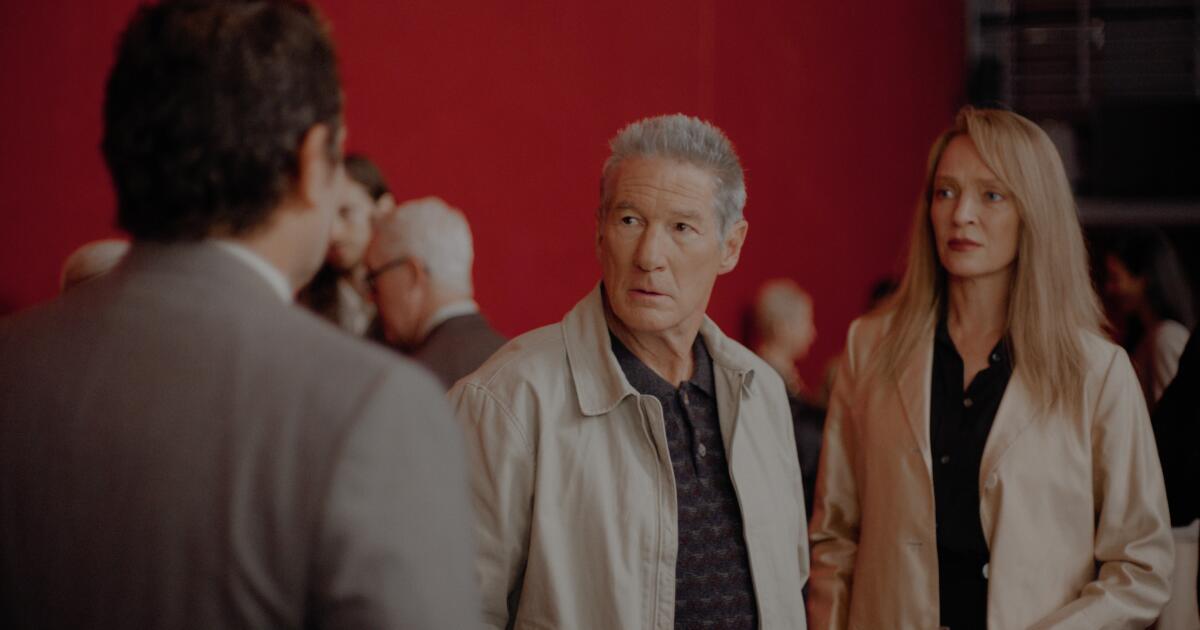Forty-five years after Paul Schrader immortalized Richard Gere as an “American Gigolo,” he’s cast him again as a rather run-of-the-mill American cad. “Oh, Canada,” a stiff and cerebral eulogy, skims along the confessions of a dying man named Leonard Fife (Gere), a Montreal-based documentarian who has agreed to let his former students record his last moments.
Schrader adapted the script from the 2021 novel “Foregone” by two-time Pulitzer nominee Russell Banks, and in both the book and the screenplay, the filmmaking crew — spouses Malcolm (Michael Imperioli) and Diane (Victoria Hill), and their assistant Sloan (Penelope Mitchell) — intend to lionize their old professor as an antiwar activist who chose exile in Canada over combat in Vietnam. But Leonard is sick of play-acting the martyr, especially in front of his exhausted wife, Emma (Uma Thurman), and seizes the chance to turn the camera into a confessional. From there, Schrader and his cinematographer Andrew Wonder stage the worst things Leonard claims to have done as stilted flashbacks. The triteness makes us uncertain how much of his impassioned purging is the truth.
Schrader tries to channel Banks’ lyricism through a narrator, Cornel (Zach Shaffer), Leonard’s abandoned son, but as the boy is mostly offscreen, the conceit gets confusing. The director and the author were friends before the latter’s death in 2023, and Schrader promised to give his version the title Banks wanted but couldn’t have. Like a slow-burning magic trick, the Great White North comes to represent the idea of a border you can’t cross twice. The ancient Greeks could have called the movie “Oh, River Styx.”
On the page, reality and self-delusion meld into a lovely memory soup. Here, the blurring is visual: Sometimes Leonard floats into the past looking like Gere, who wears the character without a shred of self-protection as the lens gawks at his raw skin. More often, Leonard summons up an idealized version of himself as a polite but adrift womanizer played by Jacob Elordi. It takes chutzpah to cast an actor who towers over Gere by more than half a foot, and then double down by shooting Elordi to look even taller. In one scene, his head practically pokes into the rafters of a gymnasium.
Banks wrote of “a hologram named Fife, Leonard Fife, a remembered version of the man as remembered by the man himself.” So sure, being Jacob Elordi is the cherry on top of his hallucination. Leonard’s reveries are less surreal and more uncanny valley, so the film feels a bit flat-footed when it plops Thurman in a dual role belabored by a distractingly bad fright wig, or makes us endure artificial conversations between Leonard and his earlier wife, Alicia (Kristine Froseth), a pregnant bride who looks and talks like a precious doll. “We’ll be the perfect family,” she beams.
I’ll give Schrader the benefit of the doubt that his dialogue is stilted by design, even though the female characters are particularly prone to clunkers. (Thurman has to utter this five-word poem: “Test results. Cancer. What kind?”) But it’s still irritating to sit through, and once we start questioning everything we see — would young Leonard really order a bran muffin at an ice cream parlor? — it gets harder to hand over our trust when the movie wants to get emotional. There’s a particularly bizarre moment when Malcolm, a character old enough to have a head of gray hair, can’t buy Leonard’s claim that people once smoked on airplanes. By my guesstimate, that was legal up until Malcolm was 22? I was more convinced by a moment where Imperioli, bless him, tests a Canadian accent. Caught sneaking away to the bathroom mid-confession, he apologizes with: “Sorry ‘boot that.”
One of Leonard’s sins turns out to be that he’s a snob who mocks Malcolm and Diane as “Mr. and Mrs. Ken Burns of Canada.” (“We won an Oscar,” Diane mumbles in defense.) Otherwise, the familial wreckage Leonard caused is unconscionable but sadly not that uncommon — and also not that impactful with the gentle acoustic-guitar score continually making apologies on his behalf. Nevertheless, Leonard carries himself as though burdened by a 15-foot cross, convinced that his past will shock Emma. She’s attuned to how much this filming session is hurting him, but his wife knows him better than he suspects. Leonard just wants to admit that he’s a coward who never loved anyone, she says with a shrug. The gulf between his guilt and her blasé reaction is filled by his own suffering; he’s so consumed by shame that he doesn’t even ask for forgiveness. Yet, when Emma dips out of the room herself to check her phone, he’s offended. How dare she miss out on remembering him exactly as he wants her to?
Leonard shares elements of Banks’ own life: the multiple marriages, the boyish dreams of running away to Cuba. You can’t help but notice that Gere’s crude haircut and silvery neck stubble make him seem an awful lot like Schrader too, especially when Leonard looks back at his own movies and wonders if an image can make someone immortal.
Schrader must know the answer to that. His movies and screenplays are baked into our culture, our daily conversations, like mortar. (Is there anyone reading this who hasn’t quipped, “You talkin’ to me?”) And like Leonard, Schrader wants to shape how he’s remembered, even though we in the audience will always have final say. To me, he’s Hollywood’s irascible philosopher, a truth-teller whose truths should also be taken with a full shaker of salt. I hope he keeps his camera rolling.

